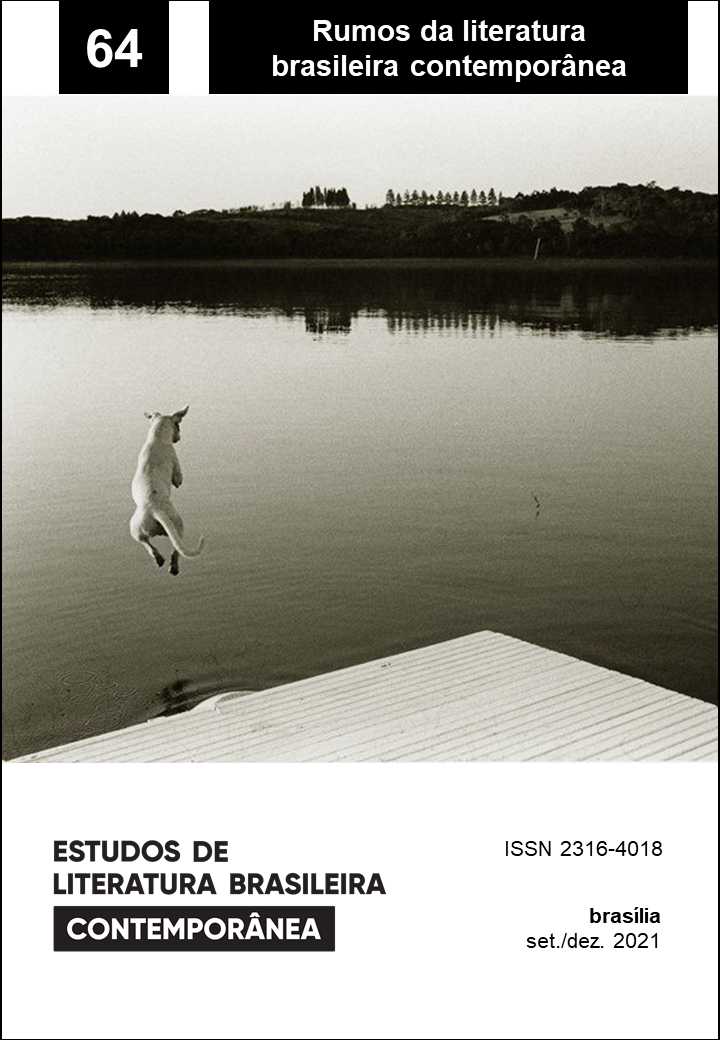Unspecificity and politics in recent Brazilian literature
DOI:
https://doi.org/10.1590/2316-4018643Keywords:
Roy Frankel, unspecificity, politicsAbstract
“We write what we hear and never what happened”, this phrase by Oswald de Andrade, retrieved in the epigraph of the book Delírios de damasco, by Veronica Stigger, invites us to reconfigure what we understand about literary writings. Likewise, it calls for a writing practice that does not coincide with itself. This non-coincidence is called here in this text ‘unspecificity’ a notion by the author Florencia Garramuño, which serves as an approximation to the reading of the poem “Sessão” (2017), by Roy David Frankel. This encounter, which centralizes the debate in the text, brings a series of provocations to recent literary practices and to the current Brazilian political scenario figured since the Coup d'état in 2016. The effort is to take current literary practices as a possible space for political construction in the form of impropriety and impertinence.
Downloads
References
FOLLAIN, Vera Lúcia (2019). Prefácio. In: VILLA-FORTE, Leonardo (2019). Escrever sem escrever: literatura e apropriação no século XXI. Rio de Janeiro: Editora PUC-Rio.
FRANKEL, Roy David (2017). Sessão. São Paulo: Editora Luna Parque.
GARRAMUÑO, Florencia (2014). Frutos estranhos: sobre a inespecificidade na estética contemporânea. Rio de Janeiro: Rocco.
KIFFER, Ana (2014). A escrita e o fora de si. In: KIFFER, Ana; GARRAMUÑO, Florencia (org.). Expansões contemporâneas – literatura e outras formas. Belo Horizonte: Editora UFMG.
OLINTO, Heidrun Krieger; SCHØLLHAMMER, Karl Erik (2016). O lugar da crítica na literatura e nas artes contemporâneas. In: OLINTO, Heidrun Krieger; SCHØLLHAMMER, Karl Erik; SIMONI, Mariana (org.). Literatura e artes na crítica contemporânea. Rio de Janeiro: Editora PUC-Rio.
SCHWARTZ, Roberto (1992). Nota sobre vanguarda e conformismo. In: SCHWARTZ, Roberto. O pai de família e outros estudos. Rio de Janeiro: Paz e Terra. p. 43-48.
SIGNORINI, Inês (2019). Escritas humanas, mas não humanísticas. Trabalhos em linguística aplicada, Campinas, v. 58, n. 2, p. 544-565, maio/ago.
VERONESE, Cosetta. Can the humanities become post-human? Relation. Beyond Anthropocentrism, v. 4, n. 1, p. 97-101, June.
VILLA-FORTE, Leonardo (2019). Escrever sem escrever: literatura e apropriação no século XXI. Rio de Janeiro: Editora PUC-Rio.
Downloads
Published
How to Cite
Issue
Section
License
Copyright (c) 2021 Paulo César Thomaz, Débora Lucas Duarte

This work is licensed under a Creative Commons Attribution-NoDerivatives 4.0 International License.
Authors who publish in this journal agree to the following terms:
a) The authors maintain the copyright and grant the journal the right of first publication, the work being simultaneously licensed under the Creative Commons Attribution License-Non Commercial 4.0 which allows the sharing of the work with acknowledgment of the authorship of the work and publication this journal.
b) Authors are authorized to enter into additional contracts separately, for non-exclusive distribution of the version of the work published in this journal (eg publish in institutional repository or as a book chapter), with authorship recognition and publication in this journal.
c) Authors are allowed and encouraged to publish and distribute their work online (eg in institutional repositories or on their personal page) after the editorial process, as this can generate productive changes, as well as increase the impact and citation of published work (See The Effect of Free Access).
d) The authors of the approved works authorize the magazine to, after publication, transfer its content for reproduction in content crawlers, virtual libraries and the like.
e) The authors assume that the texts submitted to the publication are of their original creation, being fully responsible for their content in the event of possible opposition by third parties.


